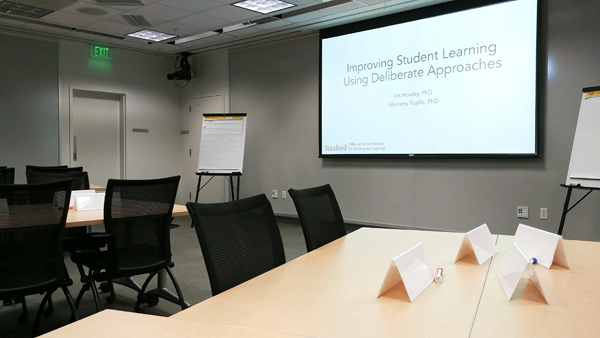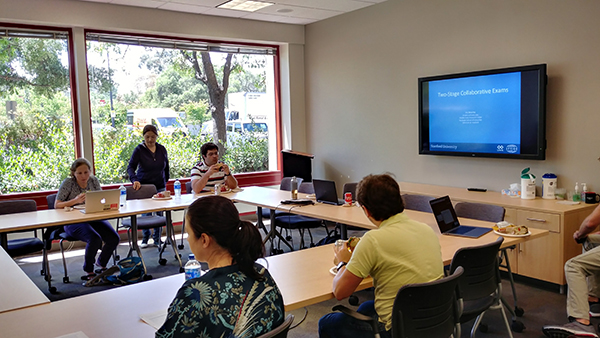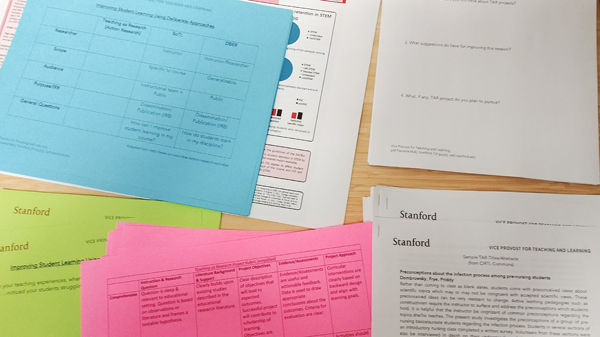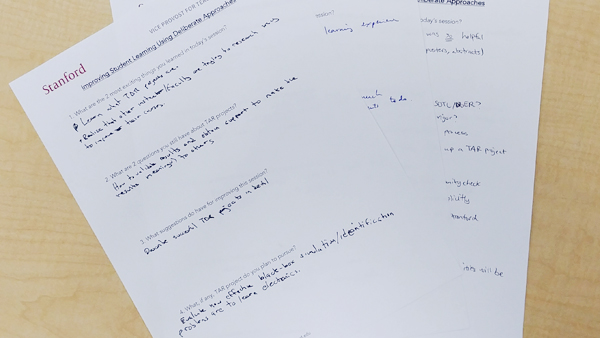Pedagogy for Higher Education Instructors

Description
As a postdoctoral research fellow, I co-organized and lead a sampling of pedagogical workshops for higher education instructors. There's a lot of research on this topic, but getting the practical outcomes into the hands of practitioners is an important step. My two first steps: (1) a Teaching as Research Workshop for Higher Education Instructors and (2) a postdoc pedagogy journal club on Two-Stage Collaborative Exams.
Two-Stage Collaborative Exams Workshop for Postdocs
Shortly before leaving my postdoc position in 2017, I designed and lead one of the Postdoc Pedagogy Journal Club meetings hosted by the office of Postdoctoral Affairs. My topic was Two-Stage Collaborative Exams, and the readings can be found here:
- Gilley & Clarkston (2014). “Collaborative testing: Evidence of learning in a controlled in-class study of undergraduate students.” [Empirical legitimacy] Link
- Rieger & Heiner (2014). “Examinations that support collaborative learning: the students' perspective.” [Brief exemplar] Link
- Weiman et al. (2014). “Physics exams that promote collaborative learning.” [Brief exemplar] Link
- Jang et al. (2017). “Collaborative exams: Cheating? Or learning?” [Brief exemplar] Link
- Smith et al. (2009) “Why peer discussion improves student performance on in-class concept questions.” [Theory behind the learning outcomes] Link
- Supplemental readings [other disciplines beyond physics]: psychology, sociology , nursing, and biology.
Two-stage collaborative exams are exams in which the first phase of the exam is done individually, and the second stage is done collaboratively with an extended or isomorphic question from the individual portion of the exam. This approach leads to increased learning for students.
Documentation
Slides & Hand-outs for 1:00 Two Stage Collaborative Exams Workshop for Postdocs. This lesson was held in June 2017 as part of the Stanford University Postdoc Pedagogy Journal Club hosted by the Office of Postdoctoral Affairs.

Teaching as Research Workshop for Higher Education Instructors
In 2017, along with Gloriana Trujillo, I co-developed & co-lead a pilot version of a 1.5-hour workshop on developing Teaching as Research projects for faculty, staff, and students through Stanford University's Office of the Vice Provost for Teaching and Learning. We had 12 participants from a variety of disciplines in attendance.
The workshop was announced with the following description: "What do you do when you see your students struggling in your classroom, or when you see an opportunity for change? In this session, participants will examine the Teaching as Research approach, critique Teaching as Research projects, and generate a preliminary idea for a Teaching as Research project."
Documentation
Lesson Plan & Slides for 1:30 Workshop on Teaching As Research. This workshop was held in May 2017 as part of the Stanford University Office of the Vice Provost for Teaching and Learning events calendar.

Participant Evaluations
| 2 Most Exciting Things Learned | 2 Questions about TAR projects | Suggestions for improving the session | TAR project you plan to pursue |
|---|---|---|---|
| 1. That there is an IRB resource on campus that can help 2. The flexibility in TAR. | * What is the community of TAR like? * How can I add this into my teaching? portfolio - Are there TAR conferences in the Bay Area? | Interested in learning more about the methods + core concepts in designing a TAR, thinking more about the rubric | Plan to restructure a lecture seminar for summer interns. Goal is to go from 2-3% participation...to 100% participation with active learning and community building exercises. |
| Meeting other instructors, hearing their experiences, communicating my experiences + solutions | Not sure it makes sense for a project class or seminar. I'll have to reflect on this. | How does this fit in to my course? How can it help me improve teaching? | Improve + continue student learning evaluations forms for class session + end-of-term. |
| * Learn by doing * Try new things to improve learnng experience * Rubric for TAR | How to adapt to classes that are more about mathematical concepts, not much lab or research for students to do. | Provide printed copy of slides and definition of TAR. | Would like help with it |
| Other people who might be good partners for my own TAR projects. * metacognition * best practices for small classes | Methods - would love a mini course or other type of primary to learn really basic methods for learning assessment | Maybe start with clear discussion that these 3 categories exist (TAR, SoTL, DBER) + describe (I'm new to this so I was not aware of the differences). | Metacognitive activities integrated into class. |
| * Learned that TAR/SoTL/DBER exist! * Useful framework for approaching course iterations in future yrs | * Any programs at Stanford that would support initial forays into TAR studies? * Best practices for evaluating outcomes? | More examples of successful TARs? | Not sure! Need to think about it more... |
| * You can ask + answer questions with or without the obligation to publish. * The possibilities are pretty endless. There are a lot of questions that can be addressed and as an instructory you can try something and iterate. | * Is there are (or much) funding for this type of research? * How can you go about these research projects and collect data without influencing grades - giving some students an advantage - even if the assessment isn't graded some projects could influence performance on later assignments or tests. | * Projects around lab efficacy. * Projects around shaping freshman mindsets (growth vs fixed) to influence performance + major retention. | |
| TAR projects (did not hear this acronym previously) TAR project does not have to be limited to STEM fields. Heard about CIRTL (for the first time). | 1) How wide-spread are the TAR projects; i.e. how many universities, colleges (both 4- and 2-yr colleges) etc. are doing TAR projects? 2) Where does the funding come from for a community college if they want to do TAR projects? | I would have liked to have some idea about TAR projects before coming to this session. | Perhaps, not right away. May be in the future. |
| * That it's okay to do a note-very-rigorous evaluation and share it with others. * Many people are already doing this. | How do we differentiate it from standard evaluation methods like mid-and-end-quarter evals + feedback cards at the end of class | I'd like to see more good examples of TAR. | Try to evaluate individual course components. |
| differences between TAR, SoTL, DBER was _so_ helpful seeing examples was also very useful (posters, abstracts) | how can someone move a TAR project to SoTL/DBER? * what methods do you use? How to get rigor? * demystifying the IRB and dissemination process. | maybe a timeline/outline for practically setting up a TAR project help move TAR project closer to reality and sanity check set up initiatives/partnerships/collaborations more explicitly where would someone present TAR projects at Stanford | not sure yet, still figuring out what my teaching opportunities will be |
| Learn what TAR projects are + Realize that other instructors/faculty are trying to research way to improve their courses. | How to validate results and obtain support to make the results meaningful to others | Describe successful TAR projects in detail | Evaluate how effective black-box simulation/identification problems are to learn electronics. |
| TAR is useful even if it doesn't meet my standards of rigor (and this explains some of the low-rigor stuff I see in the literature) | Research methods - how to ask good survey questions, what kind of measurements are useful, etc. | Would help to see more variety of posters/abstracts. We only got to analyze one, and a more broad-less-deep overview would help. | Not sure, but definitely want to try something when I teach this summer. |
